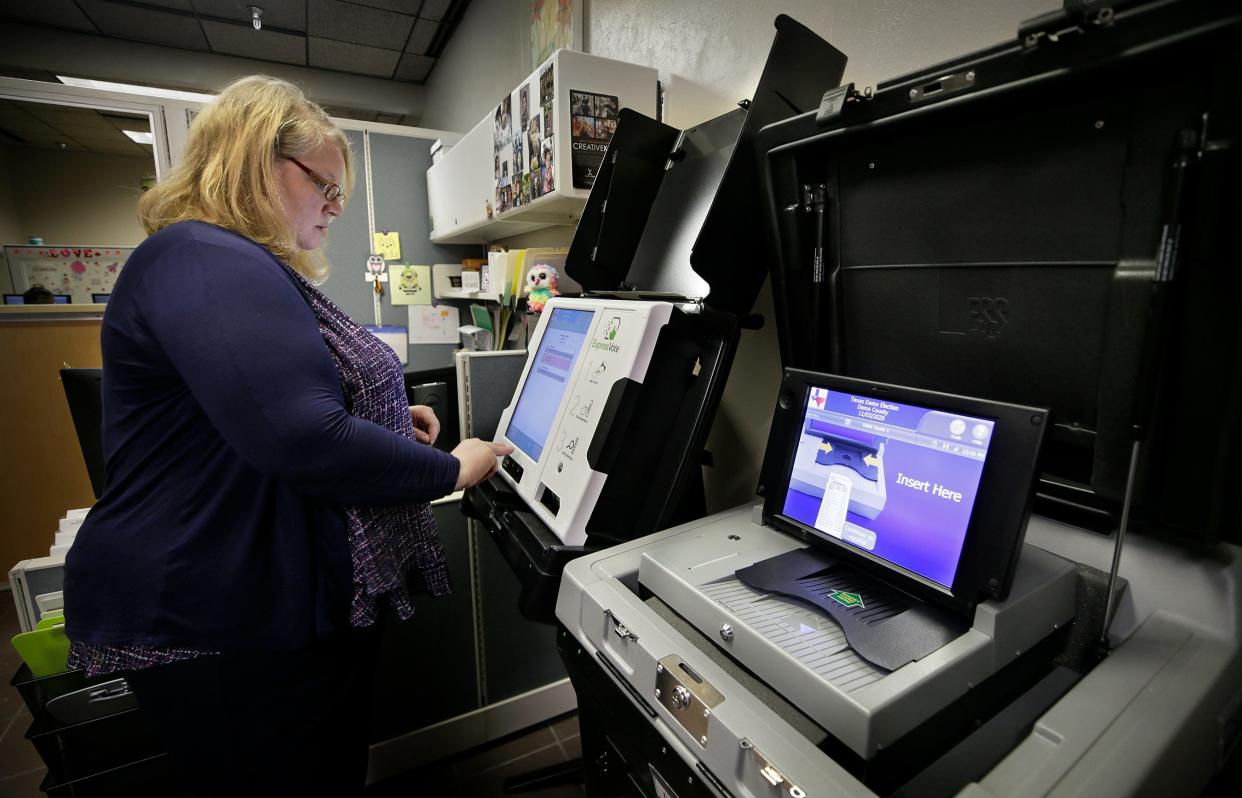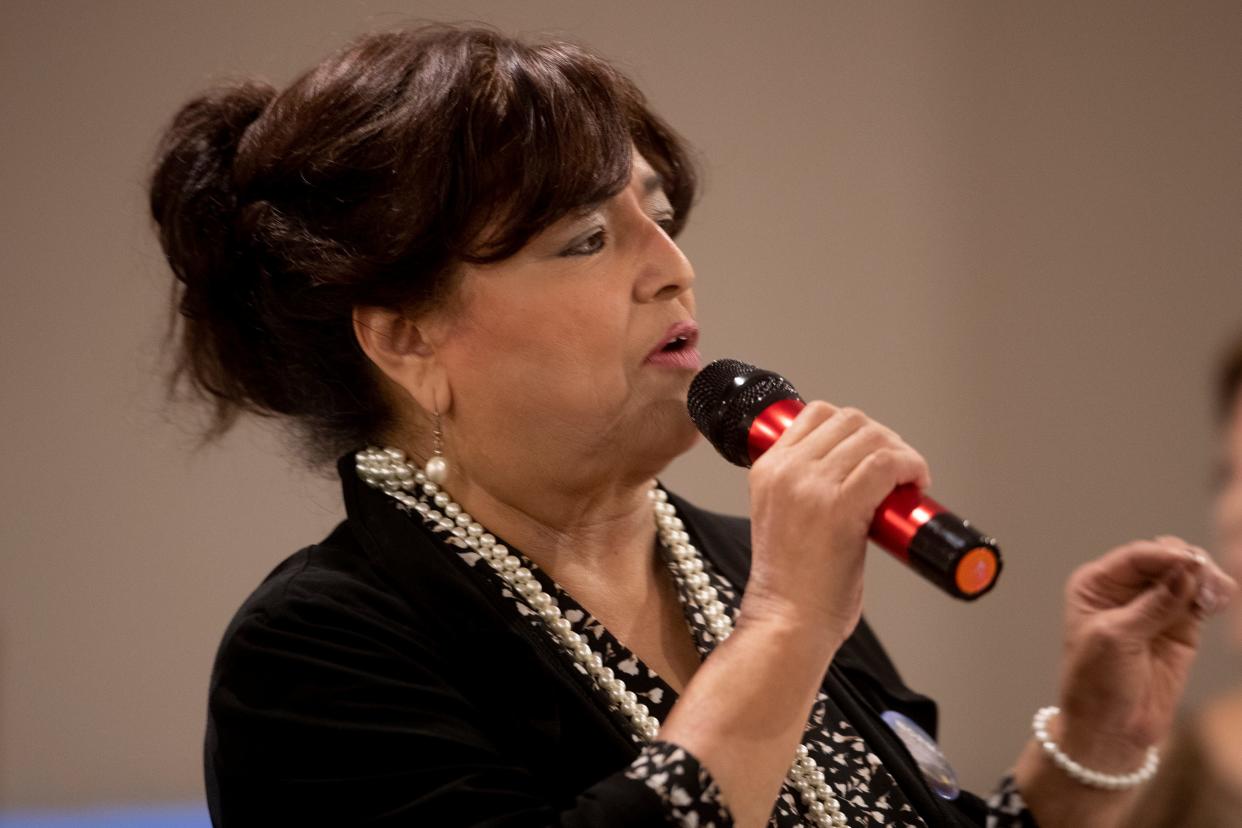El Paso's original election denier looking to make political comeback in District 77 race
Every American is familiar with former President Donald Trump's efforts to undermine the results of the 2020 presidential election.
But before those cries of wolf became a foundational Republican election strategy, some Democrats in El Paso were walking the same path.
Now, one of those Democrats is looking to make a return to politics and the former state representative still has questions about the 2018 March primary.
More: No to vouchers: District 77 candidates discuss key Texas education, workforce issues
Former state Rep. Norma Chávez was first elected to the Texas House of Representatives in 1997, a post she held until being bested in the runoff for her 2010 reelection campaign. Seven years after leaving the Texas Legislature, Chavez ran for the District 16 seat in the U.S. House of Representatives.
In the Democratic primary in March 2018, Chávez and five other Democrats were trounced by U.S. Rep. Veronica Escobar, who secured more than 62% of the vote to replace outgoing U.S. Rep. Beto O'Rourke.
But Chavez and two other Democratic primary candidates — John Carrillo and Enrique Garcia — weren't ready to accept the results.
The trio filed a lawsuit against Escobar and El Paso County Elections Administrator Lisa Wise alleging that "an election officer or other person(s) officially involved in the administration of the election" tampered "with the initial programming of some of the hard drives before the election began" and distributed "those hard drives to high-producing voting locations to extract votes from petitioners for the benefit of Veronica Escobar."
No evidence was produced to support the fraud claims and the suit was eventually thrown out.
“I was stunned that a long-time officeholder who should have been familiar with the process would not only make such an outrageous claim," Escobar said in an email, "but would go so far as to accuse hard-working public servants in the county elections office of rigging an election."
For her part, Chávez maintains that the outcome of her 2018 lawsuit would have been different had her side been able to fly in a forensic expert to conduct an analysis.
"I know who I am," Chávez said. "I am not frivolous. I never filed lawsuits or complaints, nor do I make wild unfounded accusations."
In a move eerily reminiscent of her previous comeback attempt, Chávez is now mounting a campaign to return to the Texas House representing District 77.
And despite being El Paso's first lady of election denial, despite goading lobbyists into footing the bill for a lavish graduation party in 2009, despite calling her Democratic opponent a lesbian in 2010, she has strong support from the city's Democratic elite, including former state Rep. Joe Pickett, former city Rep. Cissy Lizarraga and Eastside Democrats.
"To voters concerned about Norma Chávez's past controversies, including the election fraud lawsuit and other allegations, it's crucial to consider her entire record of service and advocacy for the people of El Paso," Emma Acosta, chair of the Eastside Democrats, wrote in an email. "While there may have been challenges or missteps along the way, Norma Chavez has demonstrated a deep commitment to addressing critical issues facing our community and advocating for positive change."
'Elections in El Paso County are secure'
Much like Trump's allegations over voter fraud and election rigging in 2020, Chávez's allegations two years earlier rang hollow as she and her cohorts presented no evidence to support their claims.
"I believed those allegations to be unfounded, as did the court," Wise recalled in an email. "The judge recognized that there was no basis for the lawsuit, and it was dropped because of lack of evidence."

Wise, who has headed the county Elections Department since 2015, said there has not been one case of voter irregularities during her tenure.
"Elections in El Paso County are secure," she said. "All of our voting equipment has been through both federal and state certification. These certifications are rigorous and take years to complete."
El Paso's voting system is a standalone system, which means it is not connected to the internet and therefore less vulnerable to cyber-attacks. Beyond that, the county Elections Department employs a variety of measures to ensure each ballot is safe.
"Prior to each election, logic and accuracy tests are performed where members of the public assist with testing all ballot styles and checking that ballots are tabulating correctly," Wise said. "There are also manual (hand count) audits conducted following each election using precincts randomly assigned by the Texas Secretary of State."
Further, she said her department is in regular contact with the FBI and Homeland Security on best practices, with assigned contacts in each agency on hand to address any concerns that arise.
Most of those measures, she noted, were already in place during the 2018 primary, but Chávez still stopped short of voicing confidence in the county's election system.
"I am confident that I will continue to advocate for voter protection and election integrity," she said.
The effects of election denial
While Chávez's foray into baseless election denial was short-lived, the effects of such accusations can have a chilling effect on voters and society at large — a good example of that is the Jan. 6 insurrection, where Trump supporters egged on by allegations of a stolen election stormed and vandalized the U.S. Capitol.
"One of the gravest threats to our fragile democracy comes from those who attack our institutions and sow distrust in our elections," Escobar said. "Trust in our institutions is fundamental to having a functioning democracy."
Furthermore, she noted, such claims have "dire consequences" that often lead to "voter suppression tactics that are anti-democratic and make it harder for people to vote" in states where lawmakers buy into such fraud allegations.
"That’s certainly been the case in Texas," Escobar said, "where early voting has been curtailed, as have vote-by-mail programs, and other innovative practices that were intended to increase voter turnout, especially for communities of color, older Americans and those with disabilities.”
And Escobar's not alone in her assessment — a 2021 study from the Center for Election Innovation and Research found that claims of election fraud have already impacted U.S. elections, especially among Republican voters.
“This poll confirms that the campaign to discredit elections has grievously injured Republican voter confidence,” David Becker, Executive Director and Founder of CEIR, said in a news release. "The evidence suggests that election denial could have a long-term negative effect on turnout, particularly among Republicans and Trump voters."
While confidence in local elections remains high, the study found that state and national elections don't enjoy the same level of voter faith: where 75% of Republican voters expressed confidence in community elections, that number drops to 61% for statewide elections and a dismal 32% for national elections.
Because election denial has largely been a Republican tactic, it's unclear how the phenomenon is affecting Democratic voters.
'Let's keep the election on today's issues'
While Democrats on the national playing field have relentlessly harped on the dangers of election denial, Chavez's previous indiscretions aren't thwarting her supporters, especially the Eastside Democrats, who represent an ally in the District 77 race.

"Let's keep the election on today's issues," Acosta said, "and not more than a decade ago."
"Norma Chávez has always been steadfast in upholding the integrity of the electoral process and advocating for fair elections," she added. "While there may have been concerns or disputes in the past, I have full confidence that Norma Chávez will accept the results of this year's March primary, just as she has respected the outcomes of previous elections."
For Acosta, Chávez's record of service during her first seven terms in the Texas House of Representatives is more than enough to warrant support from El Paso voters, including her work to establish El Paso's Texas Tech School of Medicine, her opposition to plans to use El Paso as a dump site for New York, and her efforts to allow the Tigua tribe to establish a casino.
And like the candidate herself, Acosta noted that Chávez would return to the Texas Legislature as a senior member and therefore be afforded the perks and powers of an eight-term officeholder.
"Importantly, if elected as House Representative for District 77, Norma Chávez will retain her seniority and be among the top 30 high-ranking representatives," Acosta said. "This means she will have priority in being placed on top working committees, which is significant for El Paso."
"With her elevated position, Norma Chávez will be better positioned to advocate for the needs and concerns of our community at the highest levels of government."
This article originally appeared on El Paso Times: El Paso Dems confident 2018 election denier Norma Chavez best choice
